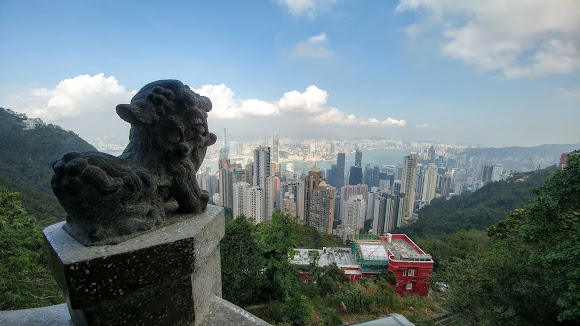I don't talk about Hong Kong often. Whenever people ask me where I am from, I usually answer them with I am from all over, that I grew up partially in Hong Kong and Canada, and then spent the last 20 years in various parts of the US. Hong Kong became that ex that I don't speak about - a place that at one point in time I knew intimately well, played a significant role in shaping me, and whose updates occasionally populate on my social media feeds. The truth though, if I were to carry on the analogy, Hong Kong felt very much like the one that got away.
You see, I do love Hong Kong. My parents grew up in Hong Kong, and they were part of the generation that had a hand in helping it reach its peak. Through their eyes, I saw a Hong Kong that worked its way out of a corrupted and conflicted past, then proceeded to build infrastructures that made it the Pearl of the Orient. I inherited their staunch belief that Hong Kong is a place of opportunity - where one can work hard and play hard, and settle down. Hong Kong was a unique place that enjoys certain civil liberties and technological advances that few places could rival. It was strategically designed to allow for a merger of the East and West in harmony on so many levels - commerce, cultural exchange, and tourism.
I too know Hong Kong well. I have literally walked from one end of the island to the other numerous times. I was familiar with the street vendors and the mom-and-pop stores in several neighbourhoods. There was a time I could have given walking tours to tourists, and if you needed me to find certain items, I knew exactly where to go and get them.
I am proud of being a Hong Konger. Time was I readily want to show Hong Kong off to people. I wanted them to see for themselves the amazing blend of East and West, the now and then. Hong Kong was a true melting pot; you can get all kinds of cuisines, buy all kinds of stuff, and experience all sorts of cultures. You can ride different modes of transport and explore so many "boroughs", each drastically different from the next.
In a way, it was sad that things between myself and Hong Kong didn't quite work out. We parted ways, and I find myself wandering in the US for the past twenty years, hopping from one city to another every few years. Subtly, I would find myself comparing each place to Hong Kong - how does it match up, where it is better, and where it is not. Hong Kong has set a bar for what I expect in a place. Now, don't get me wrong, I have had great experiences with various cities, but you never forget your first do you?
Lik it or not, I am a Hong Konger. That's the place where I was born and lived during some of my formative years. While my Cantonese and written traditional Chinese left much to be desired for, it tickles me that I grew up in one of the last strongholds that still holds true to certain Chinese traditions and culture that disappeared elsewhere under CCP influence. While we can ill afford to romanticize colonization, in Hong Kong's case, it was a success story that has yet to be rivalled or replicated, not that I would advocate for colonization. For some reason, the Hong Kong identity was preserved and made more unique under British rule, and it is something that CCP has been working steadfastly to remove in recent years. After all, if we are being candid, Hong Kong serves as a reminder of how glorious Chinese culture can be if its people were actually given the means to be educated about their history and their liberties.
Why am I waxing nostalgic about this? Well, sometimes just because a relationship doesn't work out, doesn't mean you stop caring for the other. In this case, there is a profound sadness in witnessing a once beautiful place being corrupted and entering into an abusive relationship - nay, kidnapped, hijacked, and brainwashed. Because that is in essence that is what is happening to Hong Kong. A once vibrant place, defiant in the face of tyranny, a refuge for free speech and civil liberties, now dimmed, diminished and silenced. Yes, Hong Kong has always been tiny, a literal dot on many maps, but it was fierce.
Life will go on I suppose, but I truly hate to see Hong Kong like this - battered, betrayed, and dispirited.

